
The evolution of communication, from emails to instant messaging, has ushered in a new era of productivity and seamless interaction. instant messaging introduced multiple innovative concepts that transformed how we collaborate and connect with others. However, while instant messaging has revolutionized messaging based communication, the concept has yet to be fully integrated into another essential tool for daily life: calendars.
Calendars, serving as a means of communication for time management, are ripe for a similar revolution. This article delves into the existing gaps in calendar platforms, exploring the potential to bring instant messaging concepts to calendars and transform the way we manage time. By bridging this gap, we can unlock the transformative power of shared calendars like GroupCal, fostering productivity, seamless collaboration, and improved communication.
Background
Communication and collaboration are undergoing rapid transformation with the rise of instant messaging, introducing a new paradigm in how we interact and exchange messages. People today seek more direct, collaborative and swift interactions, and the tools we use must accommodate our increasingly complex and busy lifestyles. Instant messaging concepts provide real-time communication, read receipts, group based communication, and typing indicators, enhancing the efficiency and immediacy of our interactions.
These revolutionary concepts introduced by instant messaging have also been adopted by other platforms in various areas of life. For instance, in the realm of payment, apps like Venmo allow users to send payments directly to their contact list, with real-time updates and indications when a transaction is complete. This seamless and instant payment experience has revolutionized peer-to-peer payments, making financial transactions more efficient and user-friendly. Another example is project management platforms that have integrated instant messaging features, enabling team members to collaborate in real-time, exchange ideas, and coordinate tasks swiftly. By embracing instant messaging concepts, these platforms streamline communication and foster seamless collaboration among team members, improving productivity and project outcomes.
Calendars didn’t embrace the instant messaging approaches
When it comes to time management, calendars have been slow to fully embrace the new concepts introduced by instant messaging. Unlike instant messaging apps that offer real-time updates, group collaboration, read receipts, and typing indicators, traditional calendars often require manual updates and lack real-time synchronization. This can lead to delays in sharing crucial information and potential miscommunications. The absence of read receipts and track change capabilities in traditional calendars also limits real-time feedback during event coordination. The collaborative capabilities of traditional calendars are not as seamless as instant messaging apps, making group communication and event sharing more cumbersome. This is a significant gap in calendar management, especially considering that our schedules are often influenced by external factors, such as classes, teams, or family activities, where proper group synchronization is crucial. Integrating instant messaging concepts into traditional calendars could bridge this gap, revolutionizing calendar management with real-time updates, seamless collaboration, and enhanced efficiency in scheduling and organization.
The Evolution of Instant Messaging
Instant messaging has evolved into a dominant form of real-time communication, especially with the rise of the internet. Platforms like ICQ and AIM revolutionized the way we interact, providing quick and informal exchanges that gradually replaced traditional emails. Today, instant messaging has become an integral part of daily life, with platforms like WhatsApp and Slack leading the charge. Due to its many advantages, instant messaging has surpassed traditional email technology and has become the main communication tool in the modern era. Particularly in the mobile area, instant messaging tools have gained immense popularity, becoming one of the most widely used technologies for seamless and efficient communication.
Key Concepts of Instant Messaging
- Real-Time Communication: Instantaneous exchange of messages, delivered and received instantly, enabling quick and efficient interactions.
- Group Communication: Creation and participation in groups for effective team communication and collaboration.
- Updates indications: multiple mechanisms that allow users to know when an update arrives (push notifications), and also to know the history of changes (unread circle next to groups with updates).
- Read Receipts and Message Status: indications about when messages have been read, enabling users to track interactions.
- Typing Indicators: Real-time indicators showing when someone is typing, providing instant feedback on message activity.
- Message Forwarding and Quoting: Ability to forward messages to others and quote previous messages for context.
- Presence Status: Indication of a user’s availability or online status, facilitating optimal communication timing.
Instant Messaging Concepts vs. Traditional Calendars
Calendar apps didn’t substantially change to adapt to new concepts. They are still the digital version of the traditional pen and paper calendars. Let’s discuss the main gaps in how calendars currently work vs. nowadays concepts from instant messages.
- Real-Time Communication: Unlike instant messaging, traditional calendars lack real-time communication capabilities. Users often need to manually update events, and changes may not be immediately reflected for other participants. This delay can lead to missed updates and miscommunications, hindering efficient collaboration.
- Group Communication: Traditional calendars typically lack robust group communication features. While they may allow sharing events with multiple users, they do not offer the same level of interactivity and efficiency as instant messaging platforms that enable seamless group interactions.
- Updates indications: calendar apps typically send emails when updates are made. But there is a lack of support for push notifications, and inside the app, it’s hard to know what changed, and to track the history of changes.
- Read Receipts and Message Status: Instant messaging apps provide read receipts and status indicators, allowing users to know when their messages have been read or when others are typing responses. Traditional calendars lack these indicators, leaving users uncertain about the status of their event invitations or updates.
- Message Forwarding and Quoting: In instant messaging, users can easily forward messages to others or quote previous messages to provide context. In contrast, traditional calendars do not offer such capabilities, making it challenging to share event details with others or reference past discussions.
The Rise of Shared Calendars
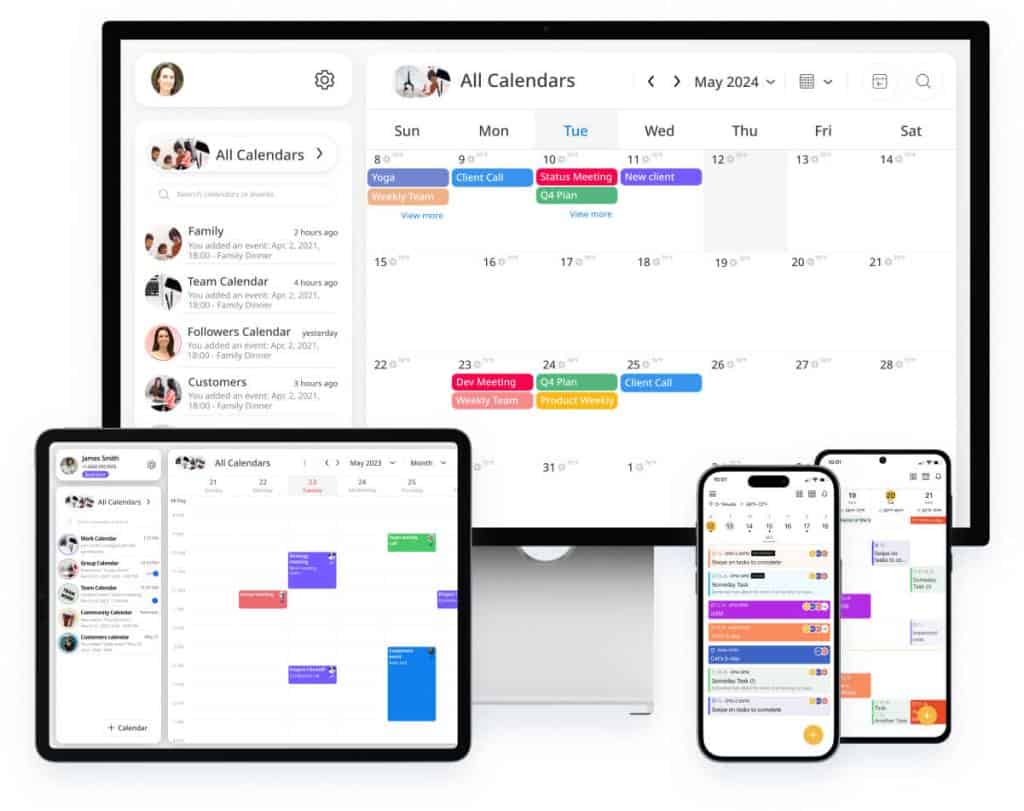
Shared calendars have emerged as a transformative solution, addressing the limitations of traditional calendars and revolutionizing the way we manage time and collaborate. By embracing key concepts of instant messaging, shared calendars like GroupCal offer a dynamic approach to scheduling and coordination, empowering users with real-time updates and efficient group collaboration. Let’s explore how shared calendars adopt these concepts to enhance productivity and streamline communication.
Key Concepts of Instant Messaging Adopted by Shared Calendars:
- Real-Time Communication: Shared calendars provide real-time updates in the form of push notifications, ensuring that all members receive immediate information when events are added, modified, or canceled. This instant communication allows teams to stay in sync and respond promptly to changes, avoiding scheduling conflicts and misunderstandings.
- Group Communication: Shared calendars enable efficient group communication by allowing multiple users to access and contribute to a single calendar. Teams can collaborate seamlessly on event planning, scheduling, and organization, fostering a cohesive and productive work environment.
- Updates indications: shared calendars such as GroupCal indicate inside the app the nature of the last change per calendar. Additionally, each calendar indicates the number of unread updates per calendar similar to instant messaging apps.
- Read Receipts and Message Status: Although not directly similar to instant messaging, shared calendars incorporate event RSVPs and notifications, providing users with status updates on event attendance. This feature helps organizers track responses and plan accordingly.
- Message Forwarding and Quoting: Shared calendars facilitate event sharing and event details quoting, allowing users to forward events to others or reference past discussions for context. This fosters clear communication and ensures that all relevant information is readily available.
GroupCal is at the forefront of the Shared Calendar Revolution
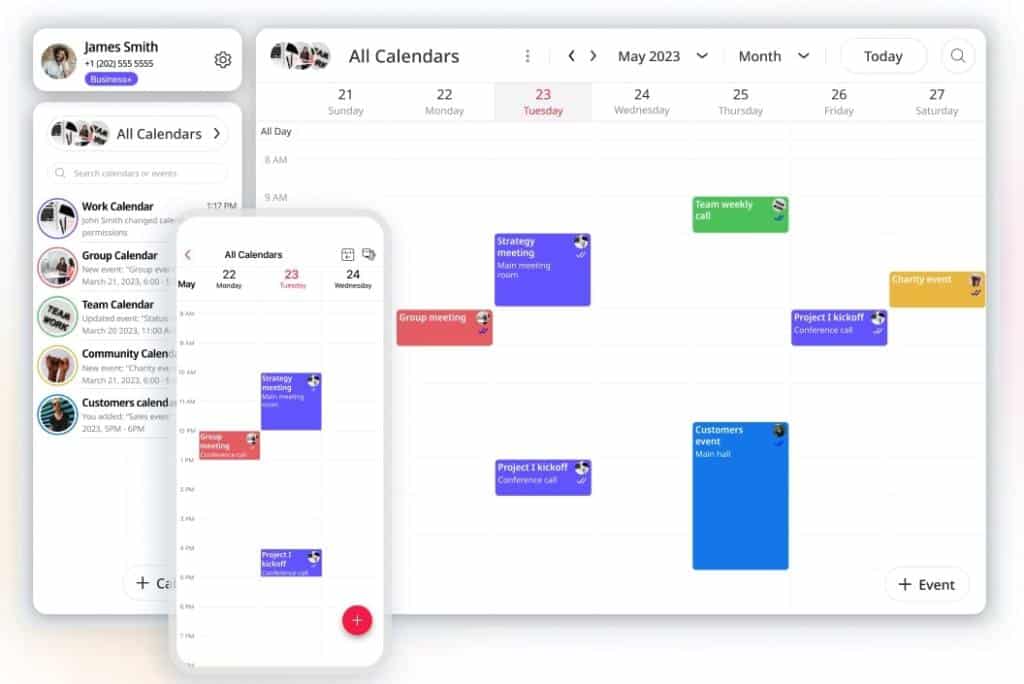
GroupCal is a shared calendar platform that lets you create and join calendars around topics such as class schedule, family calendar, work calendar and more. You can sync your events with other individuals and businesses in real time, and control who can add or edit events. GroupCal also integrates instant messaging concepts into calendar management, such as showing unread updates for each calendar, displaying messages for any changes, and allowing you to search for and join public calendar channels. GroupCal has a modern and user-friendly design that makes it easy to manage your schedule and stay connected with others. GroupCal is available as a web app and as mobile apps for iOS and Android devices. You can also sync your Google Calendar account with GroupCal to get a unified view of your personal and shared calendars.
How GroupCal Adopts Instant Messaging Concepts
Here is how GroupCal adopts modern instant messaging concepts into a calendar platform:
- Real-Time Communication: Immediate reflection of event changes across all devices for all relevant members, ensuring everyone stays updated and on the same page. Instant push notifications for added, modified, or canceled events, allowing teams to respond promptly to changes and avoid conflicts.
- Group Communication: GroupCal allows multiple users to access and contribute to a single calendar, facilitating efficient group communication.Teams can collaborate seamlessly on event planning, scheduling, and organization, fostering a cohesive and productive work environment. Group discussions and updates can be shared within the calendar platform, streamlining team communication and ensuring everyone is well-informed about upcoming events and changes.

- Updates Indications: GroupCal indicates the nature of the last change per calendar inside the app. Each calendar displays the number of unread updates, similar to instant messaging apps, keeping users informed about the latest changes relevant to them.

- Read Receipts and Message Status: Event RSVPs and notifications provide users with status updates on event attendance, offering similar functionalities to read receipts in instant messaging. Indications within the app inform users when their event updates have been viewed by other members, ensuring effective message tracking.

- Message Forwarding and Quoting: GroupCal enables event sharing and quoting of event details, allowing users to forward events to others or reference past discussions for context. This feature fosters clear communication, enhances decision-making, and ensures that all relevant information is readily available for team members.
Real-life scenarios demonstrate GroupCal’s effectiveness in various settings:
Families
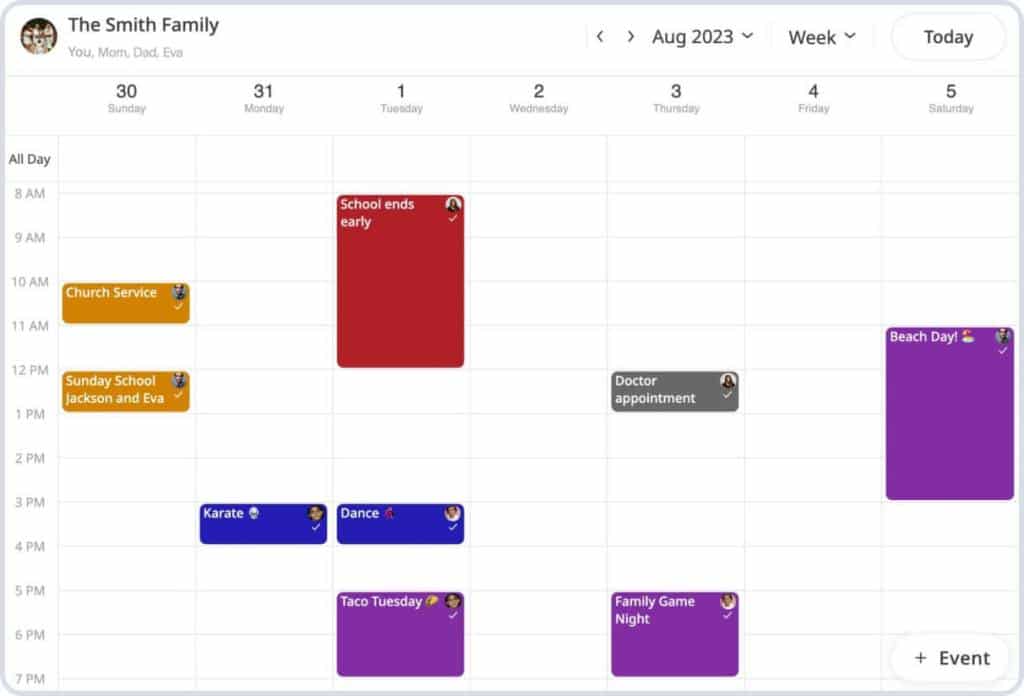
In the context of families, GroupCal’s instant updates feature plays a pivotal role in keeping everyone informed and well-coordinated. Whether it’s planning a family gathering, coordinating school events, or managing medical appointments, GroupCal ensures that any changes made to the family calendar are immediately reflected on all family members’ devices. This real-time synchronization prevents scheduling conflicts and eliminates the need for constant manual communication, providing a seamless and efficient way to manage the family schedule.
Group communication within GroupCal’s shared calendar facilitates collaborative family event planning and organization. Family members can engage in discussions, share ideas, preferences, and updates, ensuring that everyone’s input is considered. This collaborative approach not only improves the family schedule’s accuracy but also strengthens the family bond through active participation in planning and decision-making.
Community
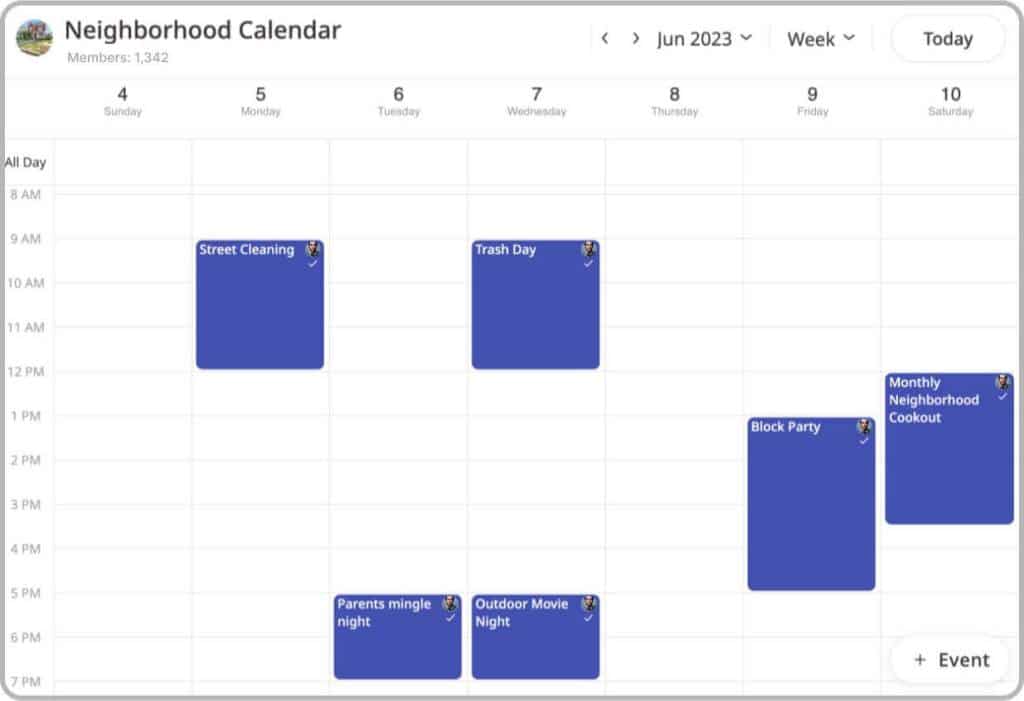
For community or social groups, GroupCal’s instant updates feature brings efficiency and cohesion to event planning and participation. With real-time synchronization, all community members are promptly informed about upcoming events, gatherings, or volunteer opportunities. This ensures maximum participation and minimizes the chances of important events being missed.
The read receipts and message status indicators in GroupCal’s event RSVP and notification system provide valuable insights to event organizers. They can track responses and attendance statuses, enabling them to make necessary arrangements and ensure successful community gatherings. This feature streamlines event coordination and allows organizers to focus on creating engaging and meaningful experiences for community members.
Work
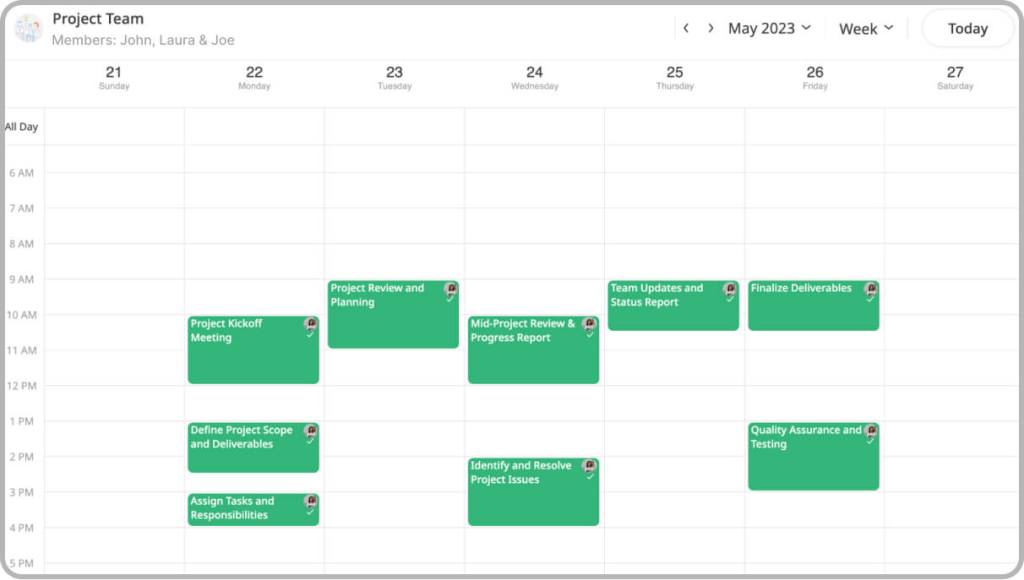
In professional settings, GroupCal’s real-time communication feature is a game-changer for project teams. Team members can instantly receive updates and respond to changes, facilitating swift coordination and decision-making. With everyone on the same page, projects can stay on track, and deadlines can be met more effectively.
GroupCal’s shared calendar feature plays a crucial role in enhancing team collaboration. Each member can contribute to event planning, share updates, and discuss project-related details within the shared calendar. This fosters a collaborative work environment, where every team member has access to the latest information and can actively engage in the project’s progress.
Embracing the Future of Calendar Management
Shared calendars, exemplified by GroupCal’s innovative approach, are poised to disrupt traditional calendar management, much like how instant messengers replaced conventional email communication. As the future of time management unfolds, shared calendars offer a glimpse into a world where calendar apps seamlessly integrate relevant calendars, similar to how instant messaging groups keep users updated with real-time information. Embracing shared calendars like GroupCal allows users to experience the transformative potential of seamless communication and collaboration in time management. By adopting shared calendars, users can look forward to a dynamic and automated scheduling experience, where their calendars are automatically updated with the schedules of different groups they belong to. Just like instant messaging groups provide real-time updates, shared calendars will keep users informed and organized effortlessly, improving productivity and efficiency for both personal and business use. The future of calendar management is embracing shared calendars and reimagining how we coordinate and communicate in our fast-paced world.

